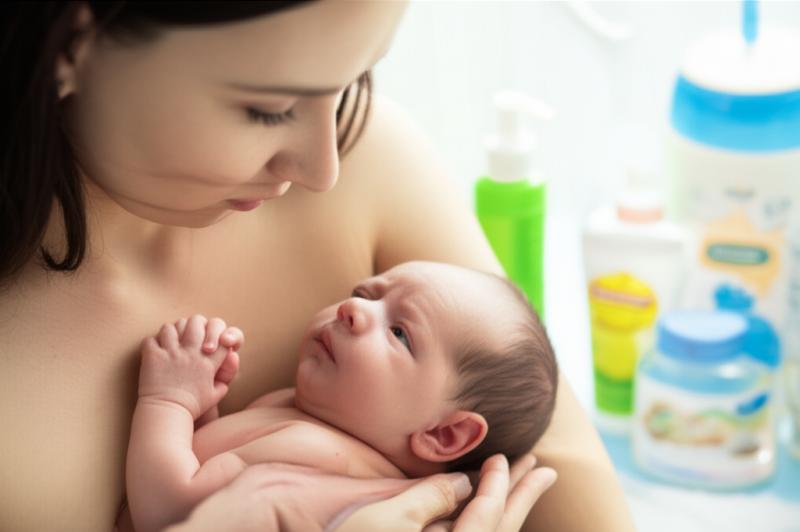Neste Artigo:
Why Should I Worry About Toxins in Baby Products?
A baby's skin is much more permeable than adult skin, meaning it absorbs substances more readily. Their developing organs are also more vulnerable to the harmful effects of toxins. Exposure to these chemicals early in life can have lasting consequences. It's not just about immediate reactions; it's about the potential long-term impact on their health and development.
The Shocking Truth About Umbilical Cord Blood
Imagine that: newborns are already exposed to a cocktail of potentially harmful substances before they even take their first breath. While the specific effects of these substances are still being researched, it highlights the importance of minimizing exposure to toxins from the very beginning.
What Toxins Are Commonly Found in Baby Products?
Navigating ingredient lists can feel like deciphering a secret code. Here are some of the most common offenders to watch out for:
- Fragrance: This seemingly innocuous ingredient is often a catch-all term for a blend of undisclosed chemicals, some of which can be allergens, irritants, or hormone disruptors. Look for "fragrance-free" or products scented with essential oils (used sparingly and with caution). Consider that even "natural" fragrances can sometimes cause sensitivities in babies with delicate skin.
- Phthalates: Used to soften plastics and as fragrance stabilizers, phthalates are endocrine disruptors that can interfere with hormone production. These chemicals have been linked to a range of developmental issues, making it crucial to avoid them in baby products.
- Parabens: Used as preservatives, parabens have been linked to hormone disruption and may have estrogenic effects. While more research is ongoing, it's best to err on the side of caution and choose paraben free baby products.
- Formaldehyde-releasing Preservatives: These chemicals, such as DMDM hydantoin, diazolidinyl urea, and quaternium-15, slowly release formaldehyde, a known carcinogen and irritant. Even small amounts of formaldehyde can trigger allergic reactions and respiratory problems in sensitive individuals.
- 1,4-Dioxane: This contaminant is often found in products that create suds, like shampoos and washes. It's a probable human carcinogen, meaning it's suspected to cause cancer in humans.
- Talc: In its natural form, talc can contain asbestos, a known carcinogen. Ensure the talc used in baby products is asbestos-free. Look for products that specifically state they are "asbestos-free" to ensure your baby's safety.
How Can I Find Safe Baby Products?
Finding safe baby products doesn't have to be overwhelming. Here's a practical approach:
- Read Labels Carefully: Become a label detective! Scrutinize ingredient lists and avoid products containing the toxins mentioned above. Don't just glance at the front of the package; turn it around and examine the fine print.
- Look for Certifications: Seek out products certified by reputable organizations. These certifications indicate that the product meets stringent safety standards.
- Choose Simple Products: Opt for products with fewer ingredients. The fewer ingredients, the lower the risk of exposure to potentially harmful chemicals. Think about it: each ingredient is a potential source of irritation or toxicity.
- Consider Organic Options: Look for organic baby products, which are made with ingredients grown without synthetic pesticides or fertilizers. While organic products may cost more, they offer a higher level of safety and environmental responsibility.
- Switch to Glass: Switching from plastic to glass for food and liquid storage can minimize exposure to chemicals like BPA. Glass is a safer and more sustainable option for storing baby food and formula.
Where Else Might Toxins Be Hiding in My Baby's Environment?
It's not just baby products you need to consider. Toxins can lurk in other unexpected places:
- Mattresses, Couches, and Carpets: These items can be treated with flame retardants, which can be harmful. Look for products made with natural materials and without added flame retardants. Consider using mattress and pillow protectors to create a barrier against potential toxins.
- Tap Water: Use a water filter to remove contaminants like lead and chlorine. Filtered water is not only safer for drinking but also for mixing formula and preparing baby food.
- Household Cleaners: Opt for natural, non-toxic cleaning products. Harsh chemicals in conventional cleaners can irritate a baby's sensitive respiratory system.
Frequently Asked Questions
What is the most important thing to look for when buying baby products?
The most important thing is to scrutinize the ingredient list and avoid products containing known toxins like fragrance, phthalates, parabens, and formaldehyde-releasing preservatives.
Are "natural" baby products always safe?
Not necessarily. The term "natural" isn't regulated, so products labeled as such may still contain harmful ingredients. Always read the ingredient list carefully, regardless of marketing claims.
Is it worth paying more for organic baby products?
Organic baby products are generally a safer choice, as they are made with ingredients grown without synthetic pesticides or fertilizers. While they may be more expensive, the peace of mind and potential health benefits are often worth the investment.
Take Action Now: Protect Your Baby from Hidden Toxins
The information presented here can feel overwhelming, but knowledge is power. Start by making small, incremental changes. Read labels, and choose safe baby products whenever possible. By taking these steps, you can create a safer, healthier environment for your baby and give them the best possible start in life. Don't wait – start protecting your little one today!

